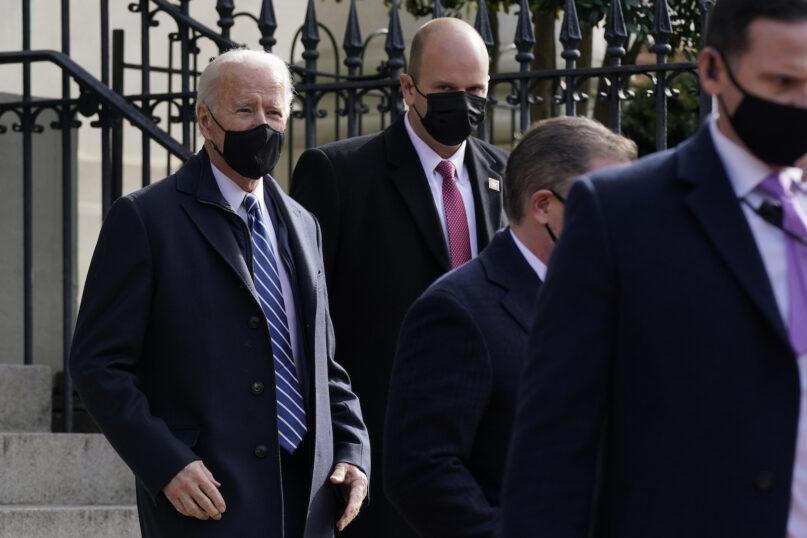(RNS) — Here’s the deal.
Joe Biden, devout Catholic that he is, accepts his church’s teaching that life begins at conception but would not impose that teaching on anyone else. That’s what he said during his vice-presidential debate with Paul Ryan in 2012, and nothing on the record suggests that he’s changed his mind since.
Moreover, running for president in 2019, he abandoned his long-standing support for the so-called Hyde Amendment, which bars federal funding for abortions under Medicaid. “I can’t justify leaving millions of women without access to the care they need and the ability to constitute — exercise their constitutionally protected right,” he said.
A couple of days after he became president, the White House issued a statement that laid out his pro-choice bona fides:
The Biden-Harris Administration is committed to codifying Roe v. Wade and appointing judges that respect foundational precedents like Roe. We are also committed to ensuring that we work to eliminate maternal and infant health disparities, increase access to contraception, and support families economically so that all parents can raise their families with dignity. This commitment extends to our critical work on health outcomes around the world.
So can a Catholic politician in good faith square the circle of being pro-life personally and pro-choice as a matter of public policy?
RELATED: A Catholic scholar weighs Biden’s future with Vatican and US bishops
The fullest, most sophisticated affirmative answer is the notable speech given by the late Mario Cuomo at Notre Dame in 1984. Like Biden, the then-governor of New York declared his acceptance of Catholic doctrine and said he wouldn’t impose it on others even as he lamented the acceptance of abortion by many Americans, including many Catholics.
“I believe that legal interdicting of abortion by either the federal government or the individual states is not a plausible possibility and even if it could be obtained, it wouldn’t work,” Cuomo said.
At the end of the day, he continued, “the question whether to engage the political system in a struggle to have it adopt certain articles of our belief as part of public morality, is not a matter of doctrine: it is a matter of prudential political judgment.”
Prudential judgment is an idea with magisterial authority in Catholic moral teaching. In his Summa Theologiae, Thomas Aquinas draws on Aristotle to distinguish individual, domestic, and political “species” of prudence, the last of which is concerned with determining the best means to achieve the common good. Necessarily, Aquinas writes, such means are “of manifold variety according to the variety of persons and affairs.”
Sen. Tim Kaine offers a good contemporary example of political prudence based on separating private belief from public action. Running for governor of Virginia in 2005 — the year the American Catholic bishops issued a call for ending the death penalty — Kaine made clear that his lifelong opposition to it had been shaped by his Catholic faith but said he would not use his office to prevent the state from conducting executions. And he didn’t — although he did veto bills that would have expanded the death penalty in the state.
Last month, Kaine introduced a bicameral bill in Congress to prohibit the federal death penalty and a week ago took to the pages of the Washington Post to applaud Virginia’s recent repeal of its death penalty as giving hope “that work for justice is not in vain.”
By contrast, there’s no reason to think that prominent conservative Catholic William Barr was exercising comparable prudential judgment when he began scheduling federal executions for the first time in years during his last months as President Trump’s attorney general. On the contrary, he seems to have acted out of his own longstanding belief in the death penalty, willfully thumbing his nose at Pope Francis’ 2018 determination that it is “inadmissible.”
In response, Bishop Frank Dewane of the Diocese of Venice (Florida) and chairman of the bishops’ Committee on Domestic Justice and Human Development, didn’t so much as mention Barr’s name in issuing a statement declaring himself “deeply concerned” that the Justice Department was starting executions again and urging that “Federal officials” take the bishops’ teaching against the death penalty “into consideration.”
That was a far cry from the agita that Biden has occasioned, including comments by a few prelates that he should be denied Communion and that he isn’t a real Catholic. After the election, Los Angeles Archbishop José Gomez formed a working group to address the president-elect’s position on abortion rights (disbanding it three months later).
Designated by the bishops as their “preeminent” political priority, abortion is of course a much bigger Catholic deal than the death penalty. Although the Bible has nothing direct to say about it, the church has opposed the practice since its earliest days.
But that doesn’t rule out prudential judgment as the way to address it. What else keeps the bishops from advocating criminal penalties for women who obtain abortions or from pushing, as they once did, for a constitutional ban?
In fact, the U.S. abortion rate has been in decline since 1981 and is now below where it was when the Supreme Court handed down Roe in 1973. The evidence is that the decline has little to do with state restrictions on abortion and that it has been greater under pro-choice Democratic presidents than pro-life Republicans.
RELATED: Joe Biden, president-elect at last, was shaped by a very American Catholic faith
I’d guess that when it comes to abortion Biden is more like Kaine than Barr on the death penalty: He’d like to see it go away.
But Biden is not the intellectual that Mario Cuomo was, and making the case that being pro-choice is the better pro-life path will put him crossways with the abortion rights advocacy wing of the Democratic Party, which no longer tolerates the kind of wishful pro-life position Cuomo once voiced.
Nevertheless, he ought to consider it.






